- Home
- Henry David Thoreau
The Essays of Henry D. Thoreau Page 5
The Essays of Henry D. Thoreau Read online
Page 5
Men in the North took each of these events as a blow not just to their self-esteem but to their manhood. When Thoreau read the news account of those who tried to prevent Sims from being carried back to the South, he was proud to find a citizen of Concord “represented in that tea-party,” but then his feelings turned to doubt and shame because the man in question was a relative newcomer and “because the men of Concord in recent times have done nothing to entitle them to the honor of having their town named in such a connexion.” The emphasis on men here is a sign that Thoreau counted himself as a grandson of the men who wrote the Constitution, a patriot in a revolutionary patriarchy on guard lest the nation’s store of manhood run out. Those early notes on “bravery” equate manhood with virtue, noting the “virility” that is the etymological link between the two.
An easy way to mark the virile strain in Thoreau’s work is to contrast his slavery essays with another work written as a consequence of the Fugitive Slave Law, Harriet Beecher Stowe’s Uncle Tom’s Cabin. The characters in Stowe’s novel weep on almost every page (and the author constantly urges the reader to join them); at the end, in answer to the question what must be done to rid the world of slavery, Stowe asks her audience to feel and to pray. Thoreau would not necessarily argue with Stowe, but his methods are not hers. Surely there are few who weep while reading Henry Thoreau. In writing about Anthony Burns, Thoreau would never think to wring our hearts with images of what young Burns’s mother must be feeling. There is feeling in Thoreau, yes, but it springs more from conscience than from sympathy, and it moves toward direct action, not prayer. He is out to stiffen the back and draw the line, not to evangelize for a religion of the heart. Like Frederick Douglass, Thoreau takes resistance to be an exercise in recovering manhood. Responding to the murder of the U.S. marshal in Boston, Douglass had written: “Every slavehunter who meets a bloody death in his infernal business, is an argument in favor of the manhood of the race.” Such was Thoreau’s position for white manhood, too, at the end of the 1850s. What he liked about John Brown was that the man did what men should do. Faced with years of humiliation at the hands of slaveholders. he didn’t go to law; he bought weapons and attacked the enemy.
VI. A LITERAL GIDEON
In October 1859 John Brown and twenty-one men attacked the federal arsenal at Harpers Ferry, Virginia, hoping to incite a slave insurrection and start a guerrilla war against the South. Though the raid revealed that the South was deeply anxious about possible slave revolts, and though it so polarized the nation that it arguably helped spark the Civil War, in the short term it was an utter failure. Although five escaped. Brown and the rest of his men were all killed or captured within forty-eight hours. Brown himself was hanged six weeks later.
After Brown was captured, and again after he died, Thoreau spoke out in defense of his actions. He had met Brown twice in Concord in the years just before the raid. In each case Brown had recently come from Kansas, where he and his sons were involved in the civil war brought on by the Compromise of 1850. Before immigrating to Kansas in 1855, Brown had been involved in a series of business ventures in New England and Ohio; he had been a tanner, a land speculator, a wool grower, and a wool merchant. Each of these enterprises had failed, most of them ending in lawsuits and bankruptcy. Brown had married twice (his first wife having died) and fathered twenty children. By the time he moved to Kansas, he had seen nine of these children die and fifteen businesses ruined. He was an unlucky man, but also stubborn, private, and self-involved, refusing to take advice from anyone and more willing to join himself to a scheme or grievance than to give one up.
Two things ran parallel in Brown’s life during his years of hapless struggle: a devout Christianity and a hatred of slavery. Brown was an old-school Calvinist of the sort who believes not just that we are “sinners in the hands of an angry God,” as Jonathan Edwards put it, but that we have an obligation to bring that wrath to bear against the sin, which in practice can mean against ourselves and our loved ones. When Brown was a small boy, his father whipped him for the most minor of crimes (for stealing three pins, for example). Brown used this style of discipline on his own children (once beating his three-year-old son, Jason, for “lying” when the boy insisted that a dream he’d had was real). It wasn’t so much about particular transgressions as about the sin each of us inherits; one time while beating another son, he astonished the boy by handing him the switch and having himself beaten until the blood began to show on his back. Severity was the mark, from first to last, of John Brown’s religion. His final communication to the world was a note handed to a jailer on his way to the scaffold: “I, John Brown, am now quite certain that the crimes of this guilty land will never be purged away but with Blood.” He was fond of a verse from Hebrews: “Without the shedding of blood there is no remission of sins.”
From his youth onward, Brown joined his Calvinism to a conviction that slavery was a sin against God, a position he had inherited from his father and from the sermons of Jonathan Edwards, Jr. At a prayer meeting in Ohio he had publicly vowed to consecrate his life to the abolition of slavery; once he had been expelled from a church for insisting on sharing his pew with black families. Many abolitionists were themselves racists, hoping to end slavery by returning American blacks to Africa, but not John Brown. He had many black friends, he treated them as equals, he called them by their surnames, and he shared his table with them. Five of the raiders on Harpers Ferry were black.
These and other parts of John Brown’s mind and method are well illustrated by his organizing a group called the United States League of Gileadites. This was early in 1851, in Springfield, Massachusetts; the Fugitive Slave Law had recently been passed, and Brown and his friends in the black community were exceedingly anxious that slave hunters would come to town and carry fugitives away. Brown thus gathered his friends and urged them to join together in a league pledged to mutual armed resistance. Forty-four men and women signed on.
Brown had taken his inspiration from a story in the Bible. In the Book of Judges we read that in the generation after Joshua, the Israelites had forsaken God, who therefore gave them over into the hands of the Midianites for seven years. At the end of these years God called on Gideon to redeem His people. Gideon at first protested (“How can I deliver Israel? Behold, my clan is the weakest … , and I am the least in my family”), but God prevailed and soon Gideon had gathered an army of more than thirty thousand men. God then announced that the army was too large; if the Israelites were to win, they might praise themselves and not the Lord. So Gideon thinned his troops until only three hundred remained. These then scattered the Midian armies, many thousands strong: “When they blew the three hundred trumpets, the Lord set every man’s sword against his fellow and against all the army; and the army fled.”
In Springfield, the League of Gileadites never set its swords against an enemy—slave hunters did not in fact arrive—but its formation was an uncanny foreshadowing of Harpers Ferry and offers a glimpse of how Brown imagined himself. To begin with, Brown thought he saw providential purpose even in such apparent evils as the Fugitive Slave Law (“It really looks as if God had his hand in this wickedness,” he wrote to his wife). And why might God have allowed an unjust majority to pass evil laws against the will of a righteous minority? To punish the faithless, first of all, but also, come the turning point, because God does not work by the carnal arithmetic of majority rule. He prefers small numbers so that His hand might be all the more evident.
In the Calvinist reading, apparently, God’s favorite number is one: one righteous man. This had been Thoreau’s position in “Civil Disobedience”: “if one honest man” resisted slavery and got locked up in jail, “it would be the abolition of slavery in America.” John Brown said the same thing to the gathered Gileadites, only Brown’s position was a touch more resistant and a touch more violent. He imagined “one bold and to some extent successful man … , defending his rights in good earnest,” then being put on “trial for life,” finally to be �
�hanged, if [he] must,” all of which would “arouse … sympathy throughout the nation,” for “nothing so charms the American people as personal bravery.”
We have here not just the literalizing of prophecy; we have also one nineteenth-century political form—or rather an apolitical form, for the final thing to note about how Brown imagines his world is that it centers on a small, unaffiliated group or, even better, on a single hero. Brown himself never joined any of the antislavery societies. There is no politics in the story of the League of Gileadites, just good against evil, a threat of violence, and the hope of heroic charm. Similarly, Brown’s style, once he had arrived in Kansas, was to work alone and in secret, never showing any interest, for example, in working with others involved in the struggle to make Kansas a Free-Soil state. In fact, by the time he went west in the spring of 1856, he had become what we would now call a terrorist.
The initial and most striking case of John Brown at work in Kansas has come to be known as the massacre at Pottawatomie Creek. Tensions were high in southeastern Kansas in the early months of 1856. Pro-slavery settlers had murdered six Free-Soil settlers in a variety of confusing situations. A pro-slavery army had attacked Lawrence, Kansas, burning the governor’s house and destroying the presses at Free-Soil newspapers. In this context, Brown and four men (two of them his sons) took it upon themselves to murder five pro-slavery settlers near their cabins along Pottawatomie Creek, about thirty-five miles south of Lawrence.
One victim was James Doyle, a poor white farmer who had left Tennessee because he’d decided that slavery was “ruinous to white labor” but had staunchly defended the pro-slavery faction once he got to Kansas. Brown’s band came to Doyle’s cabin about eleven o’clock at night and—with Mrs. Doyle weeping in the door—took the man and his two older sons out onto the road, where Brown’s sons hacked them to death with broadswords. One of Doyle’s sons had his arms cut off. Brown himself shot Doyle in the forehead to make sure he was dead. He later declared the killings to be “decreed by Almighty God, ordained from eternity.” If so, God wanted war, for soon southeastern Kansas, “Bleeding Kansas,” was plunged into chaos; armed bands roamed the countryside, one of them led by Brown. More than two hundred died before the fighting abated.
Not much detail about these matters, or about Brown’s early days, reached Concord. Thoreau knew nothing of all those disappointments in business (his “Plea for Captain John Brown” makes the baseless claim that the man had “great common sense”). As for the terror on Pottawatomie Creek, Thoreau had heard of it but had no reason to believe the story: exaggerated claims were being made on all sides, Brown himself lied about his actions, and the two New York newspapermen who had actually met Brown in Kansas got the story wrong. Beyond this, as Robert Penn Warren has argued, Brown had a gift for creating compelling stories after the fact. From all accounts, he was a persuasive and charismatic man. He stood only five feet nine inches, but everyone in Boston called him tall. People who knew him ended up speaking of him in the terms he himself had invented: his first biographer, James Redpath, happily called him one of the Gideons; after his death, so did the pacifist William Lloyd Garrison!
It was more than the old man’s fire and fabulations that fed Thoreau’s enthusiasm, however. Beyond all that, and beyond the arch individualism, there was John Brown’s impatience with words and his drive toward action. By 1859 many abolitionists had tired of talk and were ready for a fight. They had been humiliated too long. Most recently, a few days before the Pottawatomie massacre in fact, a senator from Massachusetts, Charles Sumner, had been beaten on the floor of the U.S. Senate by Representative Preston Brooks of South Carolina. Objecting to a Free-Soil speech by Sumner, Brooks had approached Sumner at his Senate desk and thrashed him with a cane so furiously that the cane shattered and Sumner, blinded by his own blood and trying to rise, ripped the bolted desk from the floor.
The beating of Sumner was merely the latest in a decades-old string of insults. As I’ve mentioned, there had been the bullying of Thoreau’s neighbor Samuel Hoar in South Carolina; there had been the removal from Boston and the public whipping of Thomas Sims; there had been the occupation of Boston for the remanding of Anthony Burns. Some eight months after the beating of Sumner, John Brown visited the recuperating senator in Boston and asked to see the coat he had been wearing when attacked. Sumner limped to the closet and brought out the garment, stiff with blood. Brown held it silently, Sumner reported, his eyes shining “like polished steel.” No wonder they loved him in Concord. Whoever was casting this melodrama had at last found someone who would stop arguing about the Constitution and arm himself.
Unfortunately, the ensuing events never rose to the restorative ending we expect from melodrama, at least not on the carnal plane. Even this, however, the proximate failure of the Harpers Ferry raid, appealed to Thoreau. To see why, let’s go back to the story of Gideon and the Midianites, where weakness and small numbers signified the Lord’s presence and the warriors’ virtue. Gideon did not fail, of course, so here we must turn from the Book of Judges and concentrate on Brown’s retelling of the tale, for note that the solitary hero he conjured up for his friends was not a “bold and successful man” but, oddly, a “bold and to some extent successful man.” In retrospect, the fable Brown spun the day he gathered his league nicely prefigured what was to happen at Harpers Ferry eight years later: a tiny army, sure they were summoned by God, were “to some extent successful” in their enterprise, though hanged in the end. That, at any rate, gives it the kind of literal-prophetic reading Brown himself preferred. A more temporal reading of that modifying clause, “to some extent,” would take it as an echo of Brown’s actual fortunes at the time and a suggestion that apparent failure might be a sign of virtue yet to be disclosed.
Regardless of how we understand what Brown does with Gideon, Thoreau was quick to assert the promise hidden in the Harpers Ferry fiasco. Reversals of this sort were Thoreau’s stock-in-trade—we travel by staying home, heaven is beneath our feet, poverty makes us rich—and for similar reasons: figuratively they point to the spiritual world (by jerking the mind away from the literal), and literally they help assuage whatever limits and losses he himself had suffered. In Brown’s case, then, Thoreau is quickly scornful of the newspapers that “talk as if a man’s death were a failure” and scornful too of a neighbor who asks (“Yankee-like”) what Brown hoped to gain by his action:
Such a one has no idea of gain but in this worldly sense … . [I]f he does not get a new pair of boots … it must be a failure. “But he won’t gain any thing by it.” Well, no, I don’t suppose he could get four-and-sixpence a day for being hung … ; but then he stands a chance to save a considerable part of his soul.
Thus in addition to weakness and small numbers, failure in this world becomes a sign of virtue, for it implies a relative lack of self-interest. Surely the motive must be high when a man acts with no idea of gain. Such, at any rate, was not only how Thoreau cast Brown but how Brown presented himself to the world after his capture. If he couldn’t be one of the triumphant Gideons of this world, then he would be one of the dying Christs who show us all that failure in one world is high success in another. In this way did the state of Virginia, by its sentence of death, get old Brown out of the Hebrew Bible and into the New Testament at last. The Lord once saw fit to send him into battle armed; now, Brown wrote from his jail cell, “Christ … saw fit to take from me a sword of steel … , but he has put another in my hand (‘The sword of the Spirit’).” Brown had a sense of narrative, and if he had to die, he knew what the form required. Before his hanging, he wrote consolingly to his family: “Remember, dear wife and children all, that Jesus of Nazareth suffered a most excruciating death on the cross as a felon.”
The story itself demanded this Christlike death. Without it, how could steel be converted into spirit? How could the seed of virtue be winnowed from the husk of failure? At his trial Brown declared, “If it is deemed necessary that I should forfeit my life for the furthe
rance of the ends of justice … , I say let it be done,” and after his conviction, when friends plotted to free him, he told them not to: “I am worth inconceivably more to hang than for any other purpose.” Nor was Brown the only one who felt the plot must end in death. The journalist James Redpath said as much; so did Henry Ward Beecher, and so did Thoreau, making his plea for the still-living Brown in a rather chilling past tense: “I see now that it was necessary that … [he] be hung … . I almost fear that I may yet hear of his deliverance, doubting if a prolonged life … can do as much good as his death.”
The fear Thoreau articulates here belongs to democracy in its American, Protestant form. Thoreau had spent a good deal of his intellectual energy trying to escape the fences of his Christian town, but when the fight against slavery drew him to the ground of actual politics, and especially when he was speaking to his actual Christian neighbors, he reverted to the local type, for whom the martyrdom of Christ is the greatest story told, now in its New World version, which promises that a majority of one might stake a transcendental claim, and then triumph by dying. That is to say, the John Brown story points toward otherwise obscure connections among the mathematics of majority rule, acts of conscience, and failure. Democratic practice has long been haunted by the fear that majority rule might bring a new form of despotism, kingship replaced by the mob. As Thoreau puts it in “Civil Disobedience,” “A wise man will not … wish [the right] to prevail through the power of the majority. There is but little virtue in the action of masses of men.” The warning to Gideon—that large numbers will obscure the hand of the Lord—is God’s version of this point. Useful, then, is the trick of spiritual reversal by which the weak are strong and the finest proof of good conscience is that the crowd will not believe in it. Thus when some fundamental change is needed, some change that the majority by its very nature cannot see, the spiritual politics of Christian democracy must call out a martyr, one whose death becomes the symbolic event by which the dissident position acquires its political life. That is why Thoreau can say, in the speech read over the dead man’s grave, that John Brown “is more alive than ever he was,” that he “had not died.”

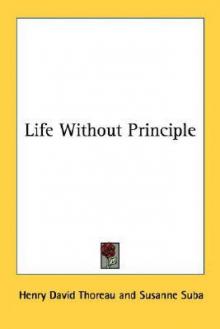 Life Without Principle
Life Without Principle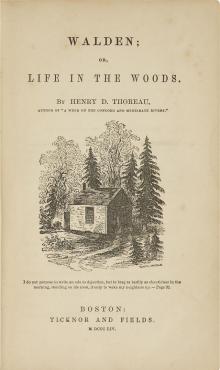 Walden
Walden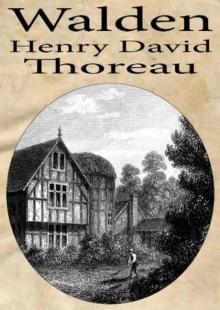 Walden by Henry David Thoreau
Walden by Henry David Thoreau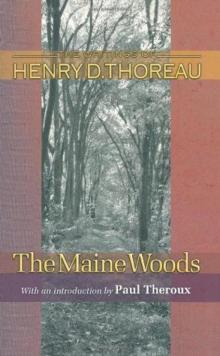 The Maine Woods (Writings of Henry D. Thoreau)
The Maine Woods (Writings of Henry D. Thoreau) The Illustrated Walden
The Illustrated Walden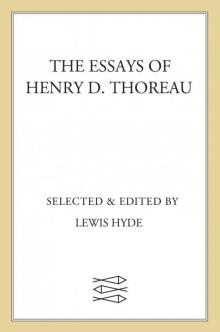 The Essays of Henry D. Thoreau
The Essays of Henry D. Thoreau